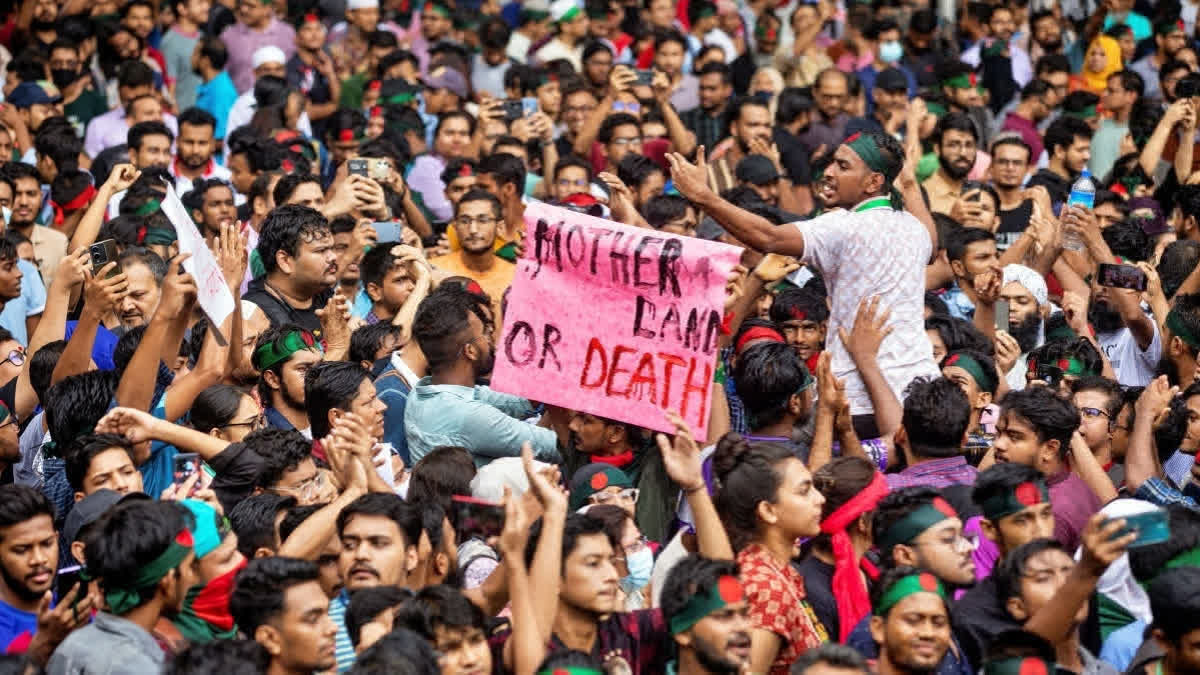New Delhi: The series of rapid political developments in Bangladesh this week that led to the ouster of Prime Minister Sheikh Hasina has raised the question of whether India should revisit its Neighbourhood First Policy. "You can change your friends but not your neighbours," former Prime Minister Atal Bihari Vajpayee had once famously said.
Though India has historically placed a significant emphasis on its relations with neighbouring countries, the formal articulation of the Neighbourhood First Policy became prominent after Prime Minister Narendra Modi took office in May 2014. This policy marked a renewed focus on building stronger ties with South Asian nations and was seen as a strategic move to ensure regional stability and mutual development.
The basic objectives of this policy are: ensuring peace and stability in the region by resolving conflicts and preventing the escalation of disputes; promoting economic cooperation and integration with neighbouring countries to foster mutual growth and development; enhancing connectivity through infrastructure projects such as roads, railways, and ports to facilitate trade and people-to-people contact; strengthening cultural and people-to-people ties through educational exchanges, tourism, and cultural diplomacy; and engaging in regional forums and organisations like South Asian Association for Regional Cooperation (SAARC) and Bay of Bengal Initiative for Multi-Sectoral Technical and Economic Cooperation (BIMSTEC) to address common regional challenges.
That India would give a renewed thrust to its ties with immediate neighbours became evident when Modi invited leaders of the SAARC countries for his first swearing-in ceremony in May 2014. It was a symbolic gesture underlining the importance of the Neighbourhood First Policy.
Key initiatives under this Policy include economic and developmental assistance, connectivity projects, trade agreements, security cooperation and humanitarian assistance during times of natural disasters. The idea behind all these is that political and socio-economic development of India is largely dependent on a stable, secure and peaceful neighbourhood.
However, despite New Delhi pursuing this Policy as a key part of its foreign policy initiatives, regime instability continues to plague India’s immediate neighbours, the latest instance being the case of Bangladesh.
In Nepal, there have been frequent changes of government since the end of monarchy in 2008 with no government able to last a full term. In Myanmar, a civil war rages on after a military coup in 2021 that saw the ouster of the democratically-elected government of Nobel laureate Aung San Suu Kyi. Sri Lanka was hit by a huge economic crisis in 2022 that saw then President Gotabaya Rajapaksa fleeing from the country. The Maldives has been swinging between pro-India and anti-India governments.
Bangladesh has now come as a tipping point. A neighbour with whom New Delhi enjoyed the closest of ties till the other day is now seeing the prospects of a potentially anti-India regime coming to power. Amidst all these, China is continuously pushing its agenda of increasing its influence among South Asian nations. It is in the light of all this that the question of whether New Delhi should revisit its Neighbourhood First Policy arises.
"The basic assumption of the Neighbourhood First Policy was that if India could share its prosperity with its smaller neighbours, then instability across the borders will not spill over into Indian territory," K Yhome, Fellow at the Shillong-based think tank Asian Confluence, told ETV Bharat. "By sharing its economic development with the smaller neighbouring countries, India wants to ensure a level of stability in the region."
Yhome explained that there is an external dimension to this as well. "By integrating economically with these countries, India could ensure that external powers inimical to its interests do not get a foothold in the region," he said. "Against this background, if we look at the political developments in Bangladesh, the question is whether India's Neighbourhood First Policy achieved the desired goals in the neighbourhood."
At the same time, Yhome said that there were domestic dynamics in Bangladesh that were beyond India's control. "Certain internal developments within these countries are not necessarily of India's making," he said."In many such cases, the dynamics are driven from within. However, in the case of Bangladesh, what brought India into the picture was Hasina's decision to take refuge in the country."
At the political level, Hasina had developed a close personal relationship with the leadership of India. She had also responded positively to India's concerns like ensuring that insurgents from the Northeast do not get shelter in her country. She is seen as secular and opposed to Islamist elements.
However, Hasina was losing popularity among the people of her own country because of her increasingly autocratic style of functioning. Ahead of the parliamentary elections in Bangladesh held in January this year, she persistently refused to accept the opposition parties' demand to install an interim government during the poll process. Though the US, EU and other Western powers persuaded her to accept the opposition's demand, she dismissed this as outside interference in an internal matter. India, all this while, maintained a neutral stance.
In the end, all the opposition parties, including the main opposition Bangladesh Nationalist Party (BNP), known for its anti-India policies in the past when it was in power, boycotted the elections that were eventually held. As a result, when Hasina’s Awami League came back to power, she started running a virtually opposition-less government. For any democracy to function properly, a strong opposition is necessary.
This created rumblings within the system. As a result, what began as a students’ movement to protest against a job quota regime, eventually blew up into a full-fledged rebellion involving Islamist forces against Hasina’s government leading to her ouster and the deaths of over 300 people. Coming back to the India-Bangladesh relationship, Yhome is of the view that this needs to be looked at two levels.
"One is to assess India’s role in the last 24 hours leading up to the flight of Hasina from Bangladesh," he said. "Although there is no evidence of India's involvement in the last moments before Hasina's departure, it appears that certain quarters within the Indian establishment were in the loop about the developments."
In fact, Hasina met with Indian High Commissioner to Bangladesh Pranay Verma in Dhaka last week and apprised him about the situation in her country According to reports, she told Verma that anarchists had tried to create Sri Lanka-type mayhem in the country during the recent quota reform movement, and they planned to topple the government. She said that the recent movement centering on quota reform was not a normal movement at all and at one stage it turned into almost a terrorist-like attack.
The second level, according to Yhome, is to assess the India-Bangladesh relationship in the past several years under Hasina's regime. "India was able to develop a deep relationship with Bangladesh under Hasina," he said.
"It was a good cordial relationship and India was able to implement certain aspects of the Neighbourhood First Policy like building connectivity. Economic ties were great. The defence relationship became strong with India providing defence equipment and training to the Bangladesh armed forces."
However, Yhome said that though economic aid and humanitarian assistance are just fine, it is the tendency of the Indian leadership to engage with any government that is in power in the neighbouring countries leaving aside the political dynamics that needs to be seen. In this connection, he mentioned the Indian establishment's engagement with the military junta leaders in Myanmar.
"What needs to be seen is whether there is a need to revisit that policy," he said. "Like the US, EU and other Western powers, should India flag issues that are of concern regionally and globally? After all, other countries see India through the prism of being the world's largest democracy."
Read More




